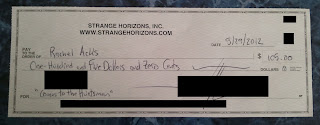Articles like this one seem designed to piss me off and make me pound out ranty things on my keyboard.
Yet putting yourself last is one of the best things that can happen to a writer. I make no moral claims for motherhood — which can bring out the worst in a person, in the form of vicarious rivalry, bitchiness, envy and even mental illness — but going through the ring of fire does change you and bring about a deeper understanding of human nature.
Well, Mrs. Craig, I’d argue it hasn’t given you a deeper understanding of the human nature of people who aren’t particularly interested in having kids.
I arrived at the essay by way of one of Amanda Marcotte‘s tweets. She made the very excellent point that you don’t see concern trolling of this sort going on about Gore Vidal or any other male author that dies. I would hope that children are a similarly transformational experience for the men who are invested in them, and that does seem to be the case from my own personal observations. A little unfair to the men, hey?
Really, it’s unfair to everyone. From start to finish, once I got past the sound of blood rushing in my ears, the essay reads like a personal justification. Sure, Mrs. Craig has less time to write, but she’s traded it for a deeper understanding of human nature and therefore that choice is superior! Or something! Everyone should do it! Have babies, it makes you more awesome and a better writer!
I am not here to make fun of the choice to have children. It’s obviously been very meaningful for Mrs. Craig, as it is for many people who go that route in their lives. But I am going to challenge this implication of inherent superiority. Having children is one branch in the path a human life can take, a major direction. It leads to one set of unique experiences and feelings.
Not having children is just as major of a path, and diverges from itself even when you consider the question of if it was by choice or not. That leads to a whole different sort of life, a different array of feelings and experiences.
Neither is superior.
The whole point of art, whether it’s painting or writing or interpretive dance or covering yourself with pudding and being an installment piece on the sidewalk for an afternoon is that you are trying to communicate and imagine through the lens of human experience. Frankly, if we all had the same experiences, I think it’d be pretty goddamn dull. It’s about getting out there and living your life to the fullest extent you can and then sharing what you’ve learned and felt and loved and lost and hated with everyone else.
Because none of us are immortal. We can’t feel every feeling and experience everything that there is in this constantly expanding world of ours. It’s not possible. That’s why there’s art, because it’s one way to share, to help people taste a life they will never otherwise know.
For some of us, living life to the fullest is having children and watching them grow, feeling all that love and pain. For some of us, it’s using the extra time and money to ride a bike along the Great Wall of China and dance until three in the morning and kiss a stranger and then have the worst hangover ever. What matters is that we’re living and creating. Unless the person you’re squaring off with does nothing but pick their belly button and watch Real Housewives, your life path isn’t inherently superior. It’s just different.
And different is good, right? Because I don’t want to live your life, as fulfilling as you find it. I want to live mine.

